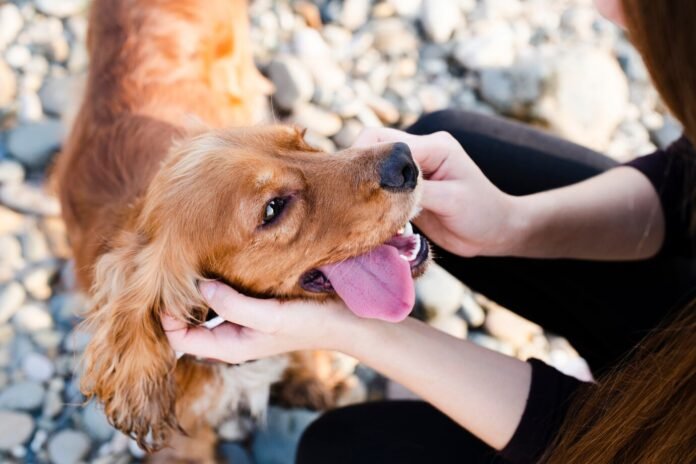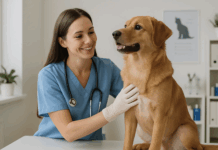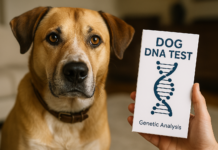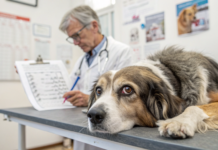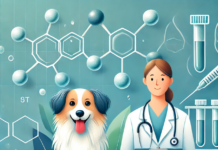Last Updated on February 14, 2024 by Dogs Vets
We all want the best for our furry friends, and a big part of that is maintaining their oral hygiene. You see, a dog’s oral health isn’t just about fresh breath or shiny teeth. It’s also closely linked to their overall wellbeing.
Poor dental hygiene can lead to problems like gum disease, tooth loss, and even more serious health issues like heart disease.
So, let’s look closer at canines’ oral health and explore how we can keep those doggy smiles bright and healthy.
A Closer Look at Dog Dental Care
Just like us, our four-legged friends can suffer from a range of oral health issues. The most common condition is periodontal disease, which affects the gums and teeth due to plaque buildup. If left unchecked, it can lead to tooth loss and even damage to the heart and kidneys.
Other common oral health problems in dogs include gingivitis (gum inflammation), oral tumors, and bad breath (halitosis). These conditions often show signs like bad breath, difficulty eating, excessive drooling, and a visible buildup of tartar on the teeth.
As pet owners, we can use many pet health products available in the market to help manage these conditions. These include specially formulated toothpaste, dental chews, and even certain diet supplements.
But remember, your dog might not always show obvious signs of discomfort, even if they’re dealing with oral pain. That’s why checking their mouth and scheduling routine vet visits is crucial.
Why Regular Vet Visits Matter
Regular vet check-ups are vital in maintaining your dog’s oral health. These visits not only help identify potential dental issues before they become severe but also offer an opportunity to professionally clean your dog’s teeth, removing plaque and tartar that home brushing might miss.
Your vet will perform a comprehensive oral examination during a typical dental check-up. This includes checking for signs of gum disease, loose or broken teeth, oral tumors, and other abnormalities.
Depending on your dog’s age and oral health status, your vet might also recommend dental X-rays to get a detailed view of your pet’s teeth and jaw.
Moreover, these visits are a great time to discuss the best pet health products for your dog’s dental care with your vet. Your vet can guide you on the right toothpaste, dental chews, and diet supplements to help maintain your dog’s oral health.
Daily Brushing: The Key to Fresh Breath and Healthy Gums
Daily brushing is the cornerstone of good oral health for your dog, ensuring fresh breath and healthy gums. Here’s a simple step-by-step guide to brushing your dog’s teeth:
- Choose the Right Tools – Dog-specific toothbrushes are available in various sizes and styles, from finger brushes to those with angled heads for better reach. Use a toothpaste specifically designed for dogs, as human toothpaste can be harmful.
- Create a Calm Environment – Let your dog get familiar with the toothbrush and toothpaste. Allow them to sniff and taste the toothpaste.
- Introduce the Toothbrush and Toothpaste – Let your dog sniff and lick the toothbrush and toothpaste before you start brushing. This helps them get used to these new objects.
- Lift Your Dog’s Upper Lip – Gently pull back your dog’s upper lip. Be careful not to pull too hard, or you might scare your dog.
- Brush Their Teeth and Gum Line – Using the toothbrush, gently brush your dog’s teeth and gum line in a circular motion. This method is most effective at removing plaque and massaging the gums.
- Focus on the Back Molars – Many dogs develop problems in the back of their mouths because these areas are often neglected. Make sure to spend some time brushing the back molars.
- Reward Your Dog – Give your dog a treat or favorite toy after brushing. This makes tooth brushing a positive experience for them, facilitating smoother sessions in the future.
Nutritional Choices and Their Impact on Oral Health
A dog’s diet significantly influences their oral health. Certain foods can help keep your dog’s teeth clean, while others can contribute to plaque buildup and bad breath.
Dry kibble is often recommended for dental health as it can scrape off plaque from your dog’s teeth. However, it should not replace brushing or professional cleanings.
Also, consider foods and treats specifically designed to promote oral health. These may have a texture that helps clean teeth or ingredients that fight bacteria in the mouth.
Dental chews are another great option. They not only satisfy your dog’s natural urge to chew but also help in removing plaque.
Look for vet-approved brands that are safe and effective. Adding fresh, crunchy vegetables like carrots or apple slices to your dog’s diet can also aid in cleaning their teeth naturally.
Water additives are another category of pet health products that can help maintain oral hygiene. These products contain enzymes or other ingredients that kill bacteria in the mouth, promoting fresh breath and reducing plaque.
Remember, every dog is unique. What works for one might not work for another. Always consult your vet about the best dietary choices for your dog’s needs.
Conclusion
Maintaining your dog’s oral health is more than just maintaining a fresh breath. It’s about ensuring your furry friend leads a healthy, happy life. So, make it a habit to prioritize your pet’s dental care.
Stay proactive and committed to your dog’s oral hygiene, from regular vet check-ups to choosing the right diet. It’s a key part of responsible pet ownership!
Fact Check
We strive to provide the latest valuable information for pet lovers with accuracy and fairness. If you would like to add to this post or advertise with us, don’t hesitate to reach us. If you see something that doesn’t look right, contact us!
